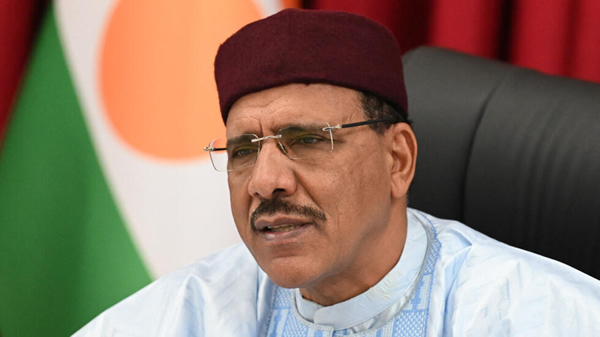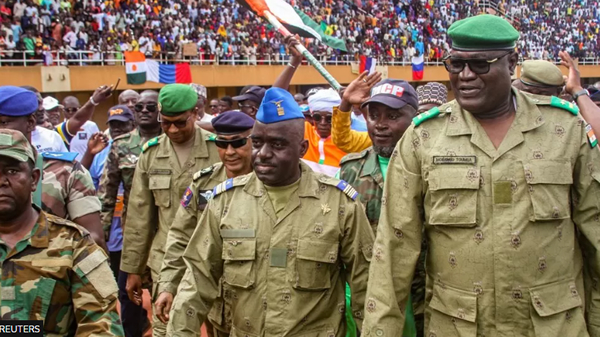
Niger’s junta threatened to kill ousted President Mohamed Bazoum if neighboring countries attempt any military intervention to restore his rule, two Western officials said.
Representatives of the junta reportedly told U.S. Undersecretary of State Victoria Nuland during her visit to the country this week that they would kill Bazoum if a foreign intervention was attempted, a Western military official told The Associated Press, speaking on condition of anonymity because of the sensitivity of the situation.
A U.S. official confirmed that account, also speaking on condition of anonymity, because the official was not authorized to speak to the media, the AP reported.
The officials spoke to the AP shortly before the West African bloc ECOWAS directed the activation of a standby force for possible use to restore democracy in Niger. ECOWAS, the Economic Community of West African States, had given military leaders a deadline of this past Sunday to reverse the coup.
Following the Sunday deadline’s expiration, the Nigerien military closed the country’s airspace, citing “the threat of intervention” as the reason. The military also pledged to defend the country from any foreign attack.
ECOWAS ordered the activation of its standby force on Thursday, while holding out hope of peacefully restoring the constitutional government in Niger after the July 26 coup there.
The announcement came Thursday in a communique read at the end of a regional summit in Abuja, the Nigerian capital.

But Niger’s junta leaders snubbed the regional gathering’s attempt to negotiate a peaceful end to the turmoil, instead naming a new government with 21 ministers.
Three coup leaders were named as the heads of the ministries of defense, interior and sports. No further plans were given in the announcement on state television.
U.S. Secretary of State Antony Blinken voiced support for ECOWAS, without explicitly backing its call at the summit for military intervention.
“ECOWAS, an organization that brings together West African countries, is playing a key role in making clear the imperative of a return to constitutional order, and we very much support ECOWAS’s leadership and work on this,” he said.
The United States in recent days has cautioned that diplomacy is the best way forward in resolving the crisis, and military force should only be used as a last resort.
Niger’s ousted leader has been in detention at his residence since members of the presidential guard took power. Bazoum’s party said Wednesday that he and his family were running out of food and had been living without electricity and running water for a week. An adviser told The Associated Press that the family had only rice and canned goods left to eat.
“We have deep concern for him, for his family, for his security and well-being,” Blinken said. “We’ve also made clear to the military leaders that we will hold them responsible for his safety and well-being.”
On Wednesday, a former rebel leader and Niger politician launched a movement opposing the military junta that seized power two weeks ago — the first sign of organized resistance to army rule in the country.
In a statement, Rhissa Ag Boula said his group, the Council of the Resistance for the Republic, will aim to reinstate Bazoum.
Boula is a former minister of tourism and a leader in two Tuareg ethnic insurgencies in Niger, one in the 1990s, the other from 2007 to 2009.
Until Wednesday, Niger’s military junta had rejected diplomatic overtures.
But they allowed two envoys sent by Nigerian President Bola Tinubu into the country, despite its closed borders: Lamido Muhammad Sanusi and Abdullsalami Abubarkar, both prominent traditional leaders.
Sanusi met with General Abdourahamane Tchiani, the coup leader, and Abukarkar met with other representatives at the airport.
“We’ll continue to do our best to bring the two parties together to improve understanding. This is the time for public diplomacy,” Sanusi told reporters upon his return to Abuja.
A day earlier, Niger’s military junta had rejected a proposed diplomatic mission from West African states, the African Union and the United Nations. The junta leaders said a “climate of threatened aggression” made it impossible to hold talks on ending the constitutional crisis in Niger.
Late on Tuesday, ECOWAS said in a statement that it would “continue to deploy all measures in order to restore constitutional order in Niger.” The 15-member bloc, along with Western allies of Niger, have placed a series of financial sanctions against the country since the coup. The financial sanctions could lead to a default on Niger’s debt repayments, Reuters reported.
The U.S. Embassy, meanwhile, has told Americans to avoid the presidential palace and downtown parts of the capital, Niamey, warning of an increased security presence to monitor demonstrations.
The embassy said Wednesday that it was aware of reports that cash and some goods were becoming scarce.
A U.S. State Department spokesperson on Tuesday said the United States still had hope for reversing Niger’s coup but was “realistic.”
Department spokesman Matthew Miller told reporters, “We are making clear, including in direct conversations with junta leaders themselves, what the consequences are for failing to return to constitutional order.”
Some information for this report came from The Associated Press, Reuters and Agence France-Presse.
Source: voanews.com























